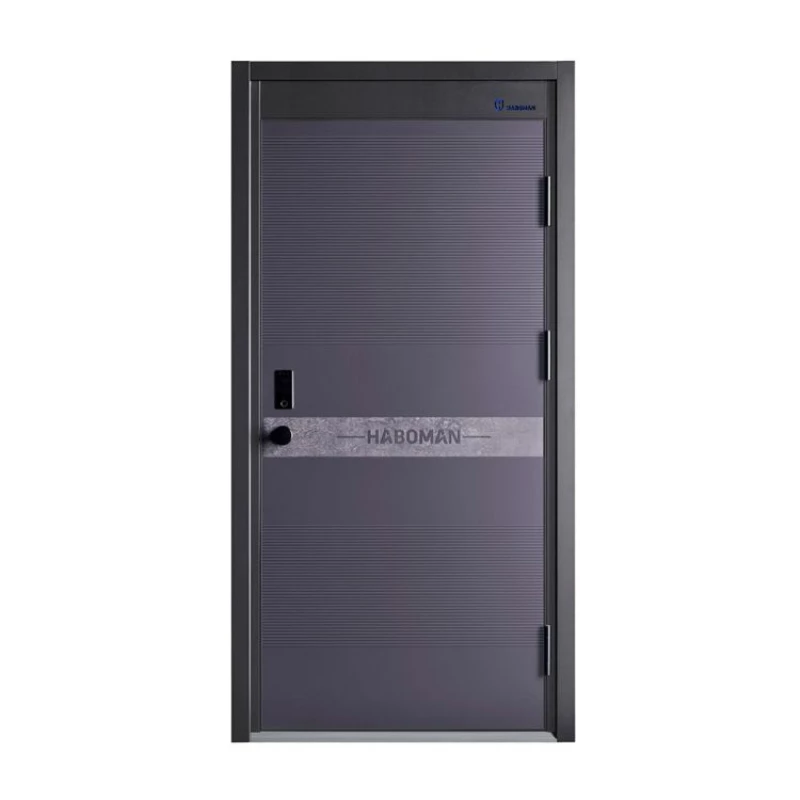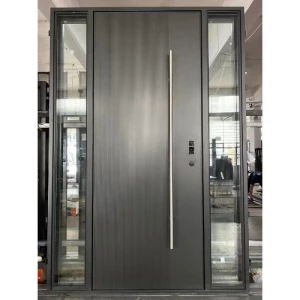Aesthetically Pleasing and Functional Secure Cast Aluminum Doors
- Standard Size
- 2050*960 (Accept Customized)
- Door Leaf Thickness
- 90mm (can be costomizes)
- Door Leaf
- Standard 2/6mm ((Accept Customized Door Leaf 0.5-2.0mm)
- Inside fillings
- Fine Steel Sesh;EPS Thermal and Sound Insulation Version
- Lock Set
- High Quality Smart Lock+Side Lock+Up-Down Lock
- Surface Treatment
- Poder Coated/Heat Transfer(Customized)
- Open Direction
- Inward/Outward/Left/Right
- Accessories
- Handle; Lock;Hinge; Peephole;Door Bell;Bolts
Will Cast Aluminum Doors Rust?
Introduction
Cast aluminum doors,as a kind of security door, are known for their strength and durability, but concerns about rusting may arise due to the perception that metals can corrode over time. In this article, we will explore whether cast aluminum doors are prone to rust and examine the factors that contribute to their rust resistance.
Material Composition
●Aluminum Alloy: Cast aluminum doors are made from aluminum alloys that contain various elements to enhance their strength and corrosion resistance.
●Non-Ferrous Metal: Aluminum is a non-ferrous metal, meaning it does not contain iron, which is the main catalyst for rust formation.
Surface Treatments
●Powder Coating: Cast aluminum doors often undergo a powder coating process, where a protective layer of dry powder is applied electrostatically and cured. This coating acts as a barrier against moisture and prevents the formation of rust.
●Anodization: Some cast aluminum doors may also undergo an anodization process, where the surface is treated to create a thicker and more durable oxide layer, further enhancing rust resistance.
Protective Coatings
●Corrosion-Resistant Paints: Specialized paints with corrosion-resistant properties are applied to cast aluminum doors, providing an additional layer of protection against rust formation.
●Clear Sealants: Clear sealants can be applied to the surface of the door, creating a protective barrier that prevents moisture from reaching the underlying metal.
Proper Maintenance
●Regular Cleaning: Cleaning cast aluminum doors with mild soapy water and a soft cloth helps remove dirt, dust, and potentially corrosive substances.
●Avoid Harsh Chemicals: Acidic or abrasive cleaners should be avoided, as they can damage the protective coatings and compromise the door's rust resistance.
●Periodic Inspections: Regularly inspecting the door for any signs of damage or wear allows for timely repairs or touch-ups to maintain its rust resistance.
Environmental Factors
●Moisture Exposure: Excessive exposure to moisture, such as heavy rain or high humidity, can increase the risk of rust formation. Proper drainage systems and routine maintenance help minimize moisture accumulation.
●Saltwater and Coastal Areas: Cast aluminum doors in coastal regions or areas with high salt content in the air may require additional protective coatings or finishes to guard against corrosion.
Conclusion
Cast aluminum doors, when manufactured with appropriate materials and protective coatings, are generally resistant to rust. Surface treatments such as powder coating and anodization, along with proper maintenance practices, help ensure the longevity and rust resistance of cast aluminum doors. Considering environmental factors and taking necessary precautions further enhances their ability to withstand rust formation. With regular care and maintenance, cast aluminum doors can provide long-lasting beauty and functionality without succumbing to rust-related issues. For more information, you can contact USELUCK DOOR.
We have more categories for you. lf you can't find the products you want above,just fill in the form and tell us whatproducts you want to import from China.





















